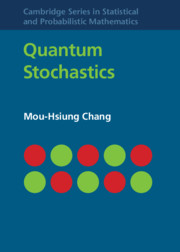Book contents
- Frontmatter
- Dedication
- Contents
- Preface
- Introduction and Summary
- 1 Operator Algebras and Topologies
- 2 Quantum Probability
- 3 Quantum Stochastic Calculus
- 4 Quantum Stochastic Differential Equations
- 5 Quantum Markov Semigroups
- 6 Minimal QDS
- 7 Quantum Markov Processes
- 8 Strong Quantum Markov Processes
- 9 Invariant Normal States
- 10 Recurrence and Transience
- 11 Ergodic Theory
- Bibliography
- Index
4 - Quantum Stochastic Differential Equations
Published online by Cambridge University Press: 05 February 2015
- Frontmatter
- Dedication
- Contents
- Preface
- Introduction and Summary
- 1 Operator Algebras and Topologies
- 2 Quantum Probability
- 3 Quantum Stochastic Calculus
- 4 Quantum Stochastic Differential Equations
- 5 Quantum Markov Semigroups
- 6 Minimal QDS
- 7 Quantum Markov Processes
- 8 Strong Quantum Markov Processes
- 9 Invariant Normal States
- 10 Recurrence and Transience
- 11 Ergodic Theory
- Bibliography
- Index
Summary
Quite a few researchers have contributed to the development of quantum stochastic differential equations driven by quantum noises, initiated by Hudson and Parthasarathy [HP84a]. A nonexhaustive list of contributors includes Fagnola and Wills [FW00], [FW03], Obata [Oba97], and Linsay and Skalski [LS10]. Based on the results presented in Chapter 3, this chapter derives and considers a general form of linear (left) and (right) Hudson-Parthasarathy quantum stochastic differential equations driven by quantum noises in symmetric Fock space with operator-valued matrices as coefficients. Specifically, it studies the existence and uniqueness of the strong and mild solution processes for both the left and right quantum stochastic differential equations and conditions under which the solution processes are unitary, isometry, co-isometry, and regular. These results make extensive use of the properties of stochastic integral driven by quantum noise and its quantum stochastic calculus in the context of a symmetric Fock space, which was explored in Chapter 3. Various discrete approximation schemes, including Bouten et al. [BvH07], of the left Hudson-Parthasarathy QSDE are also explored for numerical computation. Specifically, it is shown that the solution of the Hudson- Parthasarathy QSDE can be approximated by a sequence of discrete interaction models with decreasing time step. In order to study this problem, discrete interaction models are embedded in a limiting space. This allows one to present strong convergence of the embedded discrete cocycles to the solution of the Hudson-Parthasarathy QSDE. It will be pointed out that the way in which the embedding is done does not affect the proof of the main result for discrete approximations. Examples of a QSDE that is analytically solvable and a QSDE that possesses a mild solution but not a strong solution are also given.
QSDE of Hudson-Parthasarathy Type
It has been mentioned earlier in Chapter 3 that an open quantum systems treated in this monograph are to be formulated as a quantum system in which the underlined (or the initial) quantum system is perturbed by quantum noises that represent the environment.
- Type
- Chapter
- Information
- Quantum Stochastics , pp. 119 - 159Publisher: Cambridge University PressPrint publication year: 2015



